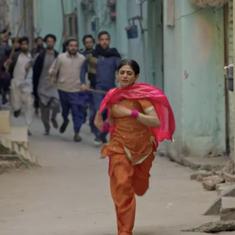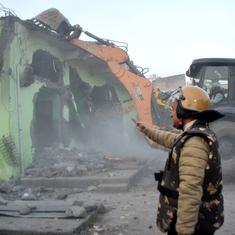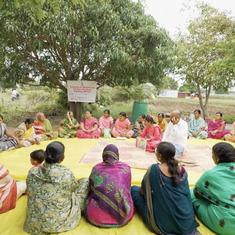UP teacher who ordered students to slap Muslim classmate booked under non-cognisable charges
This means the police need permission from a court to start an investigation against the teacher, Tripta Tyagi.

A first information report under non-cognisable charges was filed against a private school teacher on Saturday for ordering students in her class to slap their seven-year-old Muslim classmate in Uttar Pradesh’s Muzaffarnagar.
This means that the police cannot arrest the accused without a warrant. The police also need permission from a court to start an investigation.
The case was registered based on a complaint by the child’s parents a day after they had refused to pursue the matter. The teacher, Tripta Tyagi, has been booked under Sections 323 (punishment for voluntarily causing hurt) and 504 (intentional insult with intent to provoke breach of the peace) of the Indian Penal Code, according to India Today.
So basically a non cognizable report (NCR) has been registered u/s 323 and 506 at Mansoorpur police station in the Muzaffarnagar school case. Police can investigate NCR only after permission from court. pic.twitter.com/vEBdK54ErO
— Piyush Rai (@Benarasiyaa) August 26, 2023
The incident took place on Thursday. A video widely shared on social media shows that as one student strikes the Muslim boy who is standing in front of the class, teacher Tripta Tyagi urges other students to get up and hit him harder.
“I have declared – all these Muslim children, go to anyone’s area,” she can be heard telling a man off camera who agrees. She then asks another boy to hit the Muslim student on his back, saying: “Start hitting him on the waist... His face is turning red, hit him on the waist everyone.”
The incident has attracted sharp reactions on social media including from advocacy groups and Opposition leaders who described it as a “culture of hate”.
The child’s father had said on Friday that the family would not file a complaint, as a settlement had been reached with the school, according to The Indian Express. “I will not send my child to that school again and they will return the fee that I have submitted,” he said. “...The teacher has created animosity between the children.”
However, on Saturday, District Magistrate of Muzaffarnagar Aravind Mallappa Bangari told reporters that the parents have filed a complaint based on which an FIR was lodged. The Child Welfare Committee in the district is counselling the child and his parents, Bangari said.
Statement of Muzaffarnagar DM Aravind Mallappa Bangari on the FIR. The education department will also take action against the school, DM Bangari said. pic.twitter.com/HYO65SMvVV
— Piyush Rai (@Benarasiyaa) August 26, 2023
The police on Friday said that the investigation of the video revealed that Tyagi was instigating students in her class against their Muslim classmate, reported The Indian Express.
“When we investigated, we found that the woman was ‘declaring’ in the video that Mohammedan students get spoiled when their mothers don’t pay attention to their studies,” Satyanarayan Prajapat, Superintendent of Police (City), Muzaffarnagar said. “The basic education officer has been informed and departmental action will be taken against the teacher.”
On Saturday, however, the child’s father denied that religious animosity had anything to do with the matter. “This is not a Hindu-Muslim matter,” he said, according to ANI. “...We want the law to take its course.”
The father said that the child’s nephew, who had gone to the school for some work, had shot the video.
‘Minor issue’ being exaggerated, says teacher
The teacher, Tripta Tyagi, claimed that a “minor issue” had been exaggerated after the video went viral, NDTV reported.
She denied that her action was communal in nature and said that the video had been edited in a misleading manner. “There was pressure from the child’s parents to be strict with him,” the teacher said. “I am handicapped, so I made some students slap him so that he would start doing his homework.”
Tyagi said that she accepted her mistake, but said her actions had unnecessarily been turned into a “big issue”. She added: “I want to tell politicians that this was a minor issue. Leaders, including Rahul Gandhi have tweeted, but it was not such a big thing to tweet about. How will teachers teach if daily issues like these are made viral?”
Meanwhile, Deputy Chief Minister Brajesh Pathak said on Saturday that the state will maintain law and order in every situation. “We have taken the matter seriously and FIR has also been filed in the case,” Pathak told reporters. “We are with the students and will ensure that education facilities are provided to them without any disruption.”
So basically a non cognizable report (NCR) has been registered u/s 323 and 506 at Mansoorpur police station in the Muzaffarnagar school case. Police can investigate NCR only after permission from court. pic.twitter.com/vEBdK54ErO
— Piyush Rai (@Benarasiyaa) August 26, 2023









